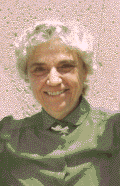MARIE A. DIBERARDINO, PH.D. '48
 When one reads the biography and the numerous testimonials on the work of Marie DiBerardino, one thought is inescapable - our Chestnut Hill alumna is a pioneer in one of the most important and controversial areas in all of science. Her field of research is cloning, specifically frog cloning, which was a precursor to the cloning of mammals, most notably the Scottish sheep Dolly. Her research has clarified aspects of reproduction, development, aging, and cancer.
When one reads the biography and the numerous testimonials on the work of Marie DiBerardino, one thought is inescapable - our Chestnut Hill alumna is a pioneer in one of the most important and controversial areas in all of science. Her field of research is cloning, specifically frog cloning, which was a precursor to the cloning of mammals, most notably the Scottish sheep Dolly. Her research has clarified aspects of reproduction, development, aging, and cancer.
Professor Laurence D. Etkin of the University of Texas MD Anderson Cancer Center describes the impact of Marie's work: "During the past 40 or so years, Dr. DiBerardino has established herself as one of the world leaders in the field of developmental biology… Her career began in the 1950s when she worked … on a problem that baffled scientists for many years … how a single cell egg developed into an entire organism that contained many different organs and cell types such as liver, muscle, lung, and brain. She was a member of the Briggs and King [research] team that addressed this problem by developing the technique of nuclear transplantation. This discovery was a beacon in the dark sea of the unknown and revolutionized modern biological sciences."
Professor Neal L. First of the University of Wisconsin (Madison) notes: "Marie has clearly been the world leader in the science of cell genomic potential, differentiation and development." Professor T. S. Ikada of Osaka, Japan, remarks that "nowadays everybody including non-scientists knows Dolly, the sheep, and speaks of cloning by the technique of nuclear transplantation." But Professor Ikada directs everyone's attention to the research that predated Dolly and, specifically, Marie DiBerardino's role in paving the way for this scientific achievement: "[Her] success of a production of complete tadpoles is esteemed as one of the most important landmarks in the whole history of studies on development and differentiation in general."
A biology major at Chestnut Hill, Marie continued her education at the University of Pennsylvania, where she earned a Ph.D. in zoology (1962), with a specialization in genetics and development. She was associated with the Institute for Cancer Research for 19 years before joining the faculty of the Medical College of Pennsylvania (MCP) in anatomy, physiology, and biochemistry. MCP-Hahnemann University named her Professor Emerita of Biochemistry in 1996 and awarded her the Lindback Award for Distinguished Teaching in 1978. She is a Fellow and Emerita Member of many international science and honor societies. Her 40 years of research have been supported by federal grants from primarily the National Institutes of Health and the National Science Foundation. In addition to conducting significant science research, Marie prepared more than one generation of medical students in genetics and in molecular, cellular, and developmental biology.
Her undergraduate education has, in her words, "prepared me well for a profession in science and, at the same time, strengthened my moral and religious values that have sustained me throughout my life." Indeed, it has, as Marie has been a featured lecturer, invited speaker, and panel participant on the topics of ethics and technology, cloning and its implications, and animal cloning for biology and medicine before audiences that include the New York Academy of Sciences, the National Institute of General Medical Sciences, and the Society for Developmental Biology.
Professor Robert McKinnell of the University of Minnesota summarizes Marie's contributions to science: "Historians of developmental biology honor Marie A. DiBerardino whose work with 'quiescent' nuclei preceded Dolly by over a decade… The scientific world in general, and workers in the field of cloning in particular, are grateful for the lifetime efforts of Marie A. DiBerardino. … [Her] research on nuclear transplantation was, and remains to the present day, the most advanced development ever recorded for an adult frog cloning experiment."







